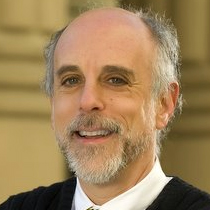
Why is it so important to talk about emotional and psychological recovery after brain injury?
One of the things that’s happened over the last ten years is that the survival rate and our ability to care medically for patients with brain injury has improved very significantly. And that is because science is moving forward. One of the areas that my colleagues and I feel has been neglected is what I’m going to call emotional or psychological recovery. It’s feeling good about yourself and your life. And one of the things that’s been frustrating to me as a clinical psychologist, as a counselor, is that there’s often talk in the press or talk on the web about medical miracles and physical cures and physical therapy. And that’s all really important. It’s so important to save the person’s life, to give them good medical care, to help them so they can leave the hospital and live independently as soon as possible. And often that happens within a month with a moderate or severe injury. We’ve really come a long way in physical rehabilitation and medical care.
But where we haven’t come a long way and where we’re focusing now is on this emotional and psychological recovery. And it’s not often addressed in acute care rehabilitation. It may take people two years, three years, five years to help people to feel good about themselves and their lives. We have to recognize that maybe people have been told by their doctor that they have made incredible progress. What their doctor has really said is that they have made incredible physical progress.
And what I have to help my patients understand is that their being physically okay doesn’t necessarily mean that they’re emotionally and cognitively okay. Part of what I help my patients with is the next step on the road to recovery, which is a focus on their emotional and psychological well-being.
Physical recovery is tangible, and the first thing that happens when people have an injury is they want to be able to talk, walk, dress themselves, cook for themselves, drive. The physical aspects of recovery are extremely important for people to live independently. And many people do at least on the surface make a good physical recovery.
But even though they’ve made a good physical recovery -- they can walk and they can talk and they can answer questions -- they have an incredibly difficult time controlling their emotions and working and maintaining quality marital relationships. And psychological emotion recovery is very subtle, you can’t see it. You can infer it sometimes from people’s behavior. But it is a great challenge and the challenge that many people are facing right now after these injuries.
One of the most discouraging things I heard in a really long time was said while I was sitting at a table having lunch with a neurosurgeon and a patient, a young man whose life had been saved about 14 months previously. We were at a Brain Injury Association conference, and basically the patient said to the neurosurgeon, "You saved my life, but I’m not really sure it’s a life worth living."
And when I heard that, I was astounded, but it was really the truth. And a lot of times when I see people early on, they have been told by doctors (very highly qualified, effective doctors and nurses) that they’re a miracle, that their life has been saved, that they’re just fine. But when the doctors say that, and I think it’s important for people to hear the truth, they really need to say that medically their life is not in danger, that they can walk and they can talk. But people want much more from their lives than the ability to walk and talk; they want to be the same kind of person they were before.
And unfortunately for many people the process of helping them regain their confidence and their emotional well-being and to be able to work again, that process may take many years and people hope it’s going to take a month or two, but many times that process takes years, no matter how hard people work.
Related Resources
About the author: Jeffrey Kreutzer, PhD
Jeffrey Kreutzer, PhD a Professor of Physical Medicine and Rehabilitation, Neurosurgery, and Psychiatry at VCU. He serves as Director of Virginia's TBI Model System, a position he has held since 1987. He also coordinates VCU Health System outpatient services for families and persons with brain injury.


Comments (3)
Please remember, we are not able to give medical or legal advice. If you have medical concerns, please consult your doctor. All posted comments are the views and opinions of the poster only.
Carol Adler replied on Permalink
Thank you so much for addressing this topic. My husband is 6 years out from a cycling/car crash and still making progress on feeling good about himself and his life. Acknowledging the emotional component of TBI sooner would’ve been very helpful for him. There was so much focus on the miracles of his physical recovery that actually made him more ashamed and depressed because he felt like he was supposed to feel more grateful and happy to be alive, while he was experiencing cognitive deficits and emotional control issues. Keep writing about this. I appreciate your work.
Adrienne Paterson replied on Permalink
Same here, its been almost 6 years since I was hit by a car running the red light while I was walking in the crosswalk. I have good days and bad, I feel like I am back in a plateau. People accused me of having a bad attitude, being ungrateful, etc...especially at work.
I feel so misunderstood and in despair today.
Sarah replied on Permalink
Thank you for this article. I relate to this four years following a mild tbi that many people don’t understand. Prior to getting hit by a car walking across the street, I was a fitness trainer. I quickly looked normal physically ignoring the chronic pain in my back and was consistent in the gym. What I lacked however was a proper evaluation of my brain aside from the typical cat scans that only show significant damage anyway. I progressively went downhill mentally and cognitively with many only to criticize and misunderstand me. Couple years later to be told my nagging concussion symptoms was a bit more severe than they thought. I’m not sure how to explain this to the people in my life as they don’t understand. The stress of ‘persecution ‘ made me feel like my brain got stuck. My doctor wasn’t much help either. I hope I can find a doctor to help refer me with some sort of treatment.